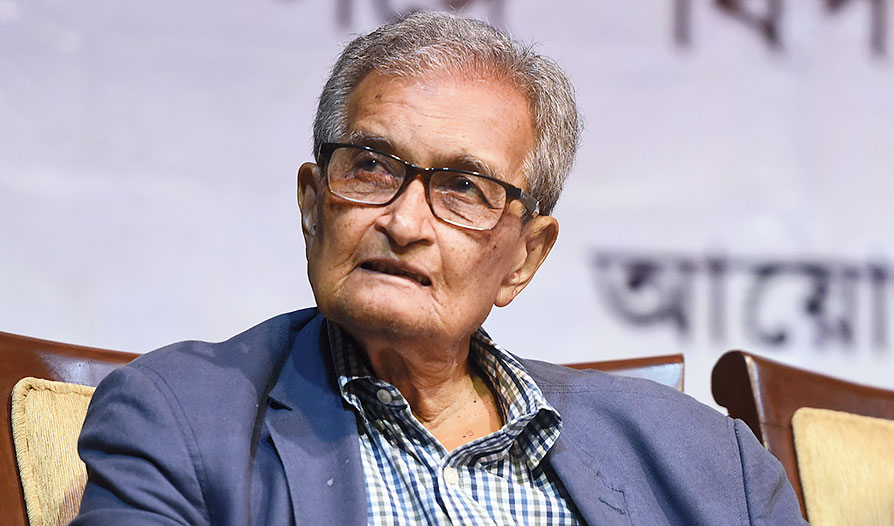Prime Minister Narendra Modi of India has led his Hindu nationalist Bharatiya Janata Party to a major victory in the country’s general election, winning more than 300 of the 543 parliamentary seats and five more years to run the country.
This is an impressive achievement, but how has Mr Modi been able to do it? And why has the Indian National Congress, the old national party, been restricted to a mere 52 seats? In attempting to answer these questions, some have been tempted to seek explanations in the realm of ideas and ideology, in particular in the dominance of Hindu identity in India.
We are told repeatedly that India has changed and that the old, pluralistic and secular ideology of the Congress party and of India’s great leaders — Mohandas Gandhi, Rabindranath Tagore, Jawaharlal Nehru and Maulana Abul Kalam Azad — is no longer an effective option. There might be an element of truth in this line of thinking.
After all, though about 200 million Indian citizens are Muslim — more than 14 per cent of India’s total population — political support for the victorious BJP comes disproportionately from the Hindus.
But ideas do not live in isolation. Are there not things happening in our actual lives that influence our ideas? This way of looking at politics starts the inquiry at too late a stage, avoiding the question of why the BJP today has many more loyal supporters than only a few years ago.
There can hardly be any doubt that Mr Modi is an exceptionally skilful and charismatic political leader. To seek a part of the explanation there might appear to some to be a lazy thought, but there is nothing wrong in trying to examine the role of Mr Modi in the startling rise of his party.
A fiery orator, he has been able to influence others’ thinking with his striking readiness to make political use of hatred and loathing — for people with different ways of life (Leftists, rationalists, liberal intellectuals) and for those with different origins and religious beliefs, such as Muslims.
Former BJP leaders, like the un-aggressive Atal Bihari Vajpayee, would certainly be unable to compete.
If Mr Modi used his charisma in electioneering, he also poured money into electoral spending — many times more than the Congress party and all the other political parties. This is in addition to the asymmetry in media coverage: The state-owned television network, Doordarshan, gave the ruling BJP twice the airtime that it offered to the Congress party in the important month of May.
The surge of nationalism after Mr Modi ordered air strikes inside Pakistan following a February attack in Kashmir on Indian troops by a Pakistan-based terrorist group also helped the BJP immensely. In fact, India’s general election was dominated by scare-mongering rhetoric, used very effectively by Mr Modi.
We can see a change in Mr Modi’s own evolution here. When he won the election five years ago, in 2014, his campaign greatly benefited from his promises of a well-functioning market economy free of red tape and corruption, plentiful employment opportunities for all, fair sharing of the fruits of speedy economic expansion, and ready availability of primary health care and school education.
In his recent campaign, Mr Modi could not brag about his achievements: he has accomplished little of what he had promised.
Unemployment is very high, a 45-year peak, economic growth is faltering and uneven in its impact, elementary health care remains comprehensively neglected, and there has been no striking decrease of red tape and corruption.
Instead, Mr Modi focused on the apprehensions and fears of Indian citizens: fear of terrorism, fear of sabotage by Pakistan, fear of apparently terrible deeds perpetrated by hostile elements within India. Just as the Falklands War in 1982 shored up support for Prime Minister Margaret Thatcher of Britain, who dramatically gained in popularity, the border battles with Pakistan in February helped Mr Modi immensely in the elections.
These factors fill up the story of what has been happening in Indian politics. Many might prefer the account that the BJP won what is called “the ideological argument” against the Congress party.
But there has been no particular victory for the philosophy of Hindu nationalism and no noticeable vanquishing of the idea of inclusiveness and unity championed by Gandhi, Nehru and Tagore.
What is clear enough is that during the past five years of BJP rule, India has become much more divided along religious lines, making more sharply precarious the lives of minorities, particularly Muslims.
The Hindu nationalist movement has won something in terms of power but nothing particularly serious in the battle of ideas. Pragya Thakur, a BJP activist, said recently that Mohandas Gandhi’s assassin, Nathuram Godse, was a patriot. This embarrassed even the BJP, which made her formally apologise.
However, Ms Thakur, who was campaigning for a seat in the state of Madhya Pradesh, went on to win and will be a lawmaker in the Indian Parliament. That is victory in terms of power but not in the battle of ideas.
It is regrettable that this larger battle has not received more emphasis even from the Opposition. There is need for much more engagement there. But the first thing is not to confuse the two battles.
New York Times News Service










